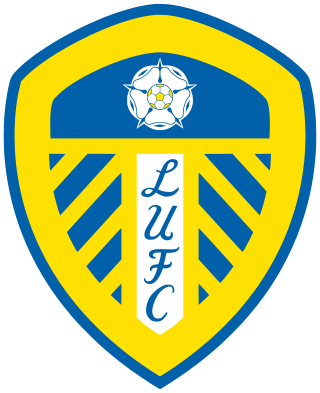
Chelsea Football Club is a professional football club based in Fulham, West London, England. Named after neighbouring area Chelsea, they compete in the Premier League, the top tier of English football. Founded in 1905, the team play their home games at Stamford Bridge. The club won their first major honour, the League championship, in 1955. They won the FA Cup for the first time in 1970, won their first European honour, the Cup Winners' Cup, in 1971, and became the third English club to win the Club World Cup in 2022.

Dennis Frank Wise is an English former professional football player and manager who played as a central midfielder. He spent the majority of his career at Chelsea, from 1990 to 2001.
In accounting, insolvency is the state of being unable to pay the debts, by a person or company (debtor), at maturity; those in a state of insolvency are said to be insolvent. There are two forms: cash-flow insolvency and balance-sheet insolvency.
Kenneth William Bates is a British businessman, football executive and hotelier. He was involved in the development of Wembley Stadium and is a former owner and chairman of football clubs Chelsea and Leeds United.
Peter Ridsdale is an English businessman who is a director at Preston North End. He was until December 2011 the Chairman of Football Operations at Plymouth Argyle. Ridsdale was previously the chairman of Leeds United, Barnsley and Cardiff City.
Southampton Leisure Holdings PLC was the parent company of Southampton Football Club Ltd and was listed on the Alternative Investment Market of the London Stock Exchange. The company was placed into administration on 2 April 2009.

Leeds United Football Club is a professional football club based in Leeds, West Yorkshire, England. The club competes in the Championship, the second tier of English football and play their home games at Elland Road.
As a legal concept, administration is a procedure under the insolvency laws of a number of common law jurisdictions, similar to bankruptcy in the United States. It functions as a rescue mechanism for insolvent entities and allows them to carry on running their business. The process – in the United Kingdom colloquially called being "under administration" – is an alternative to liquidation or may be a precursor to it. Administration is commenced by an administration order.
Trevor Birch is an English chartered accountant, football executive, and former professional footballer. He is chief executive of the English Football League. Birch has been an executive at several clubs, including Tottenham Hotspur, Swansea City, Chelsea, Leeds United, Everton, Derby County, and Sheffield United. Birch has worked at Ernst & Young, BDO International, and Duff & Phelps.
Leeds United Football Club Limited, founded 4 May 2007, is a limited company, the directors of which are Ken Bates, Shaun Harvey and Mark Taylor. The company purchased Leeds United A.F.C. via a creditors vote after the club entered administration, but this ownership was challenged by HM Revenue & Customs and the club was subsequently put up for sale by the administrators KPMG.

United Kingdom insolvency law regulates companies in the United Kingdom which are unable to repay their debts. While UK bankruptcy law concerns the rules for natural persons, the term insolvency is generally used for companies formed under the Companies Act 2006. Insolvency means being unable to pay debts. Since the Cork Report of 1982, the modern policy of UK insolvency law has been to attempt to rescue a company that is in difficulty, to minimise losses and fairly distribute the burdens between the community, employees, creditors and other stakeholders that result from enterprise failure. If a company cannot be saved it is liquidated, meaning that the assets are sold off to repay creditors according to their priority. The main sources of law include the Insolvency Act 1986, the Insolvency Rules 1986, the Company Directors Disqualification Act 1986, the Employment Rights Act 1996 Part XII, the EU Insolvency Regulation, and case law. Numerous other Acts, statutory instruments and cases relating to labour, banking, property and conflicts of laws also shape the subject.
Under UK insolvency law an insolvent company can enter into a company voluntary arrangement (CVA). The CVA is a form of composition, similar to the personal IVA, where an insolvency procedure allows a company with debt problems or that is insolvent to reach a voluntary agreement with its business creditors regarding repayment of all, or part of its corporate debts over an agreed period of time. The application for a CVA can be made by the agreement of all directors of the company, the legal administrators of the company, or the appointed company liquidator.

"Doing a Leeds" is an English football phrase which is synonymous with the potentially dire consequences for domestic clubs in financial mismanagement. The phrase arose after the rapid decline of then Premier League club Leeds United, who invested heavily in the late 1990s and early 2000s to attain domestic and lucrative European success, which was capped by high profile appearances in the semi-finals of the UEFA Cup and UEFA Champions League. However, in the process, the club built up large debts, and suffered financial meltdown after failing to continue to qualify for the competition, subsequently dropping down two levels of the football pyramid, into the third tier, Football League One.
In the United Kingdom, football clubs sometimes choose to enter administration (sanction) when they are unable to pay off outstanding debts. Under the Insolvency Act 1986, a business will face a winding-up order bringing them to court and if it is shown that a business cannot pay debts as they fall due or cannot repay outstanding debts then the company will be classified as insolvent. Administration puts accountants "in charge of pretty much everything apart from coaching the players and picking the team". For a football club in administration, the "football creditors rule" requires football-related debts such as wages owed to players and staff, and transfer fees owed to other clubs to be paid first.

Begbies Traynor is a firm specialising in corporate restructuring. They were formed in 1989, expanded through mergers and organic growth and were floated in 2004. The company employs over 700 people and has over 100 offices around the United Kingdom.
The 2011–12 season was the 132nd season of competitive football by Rangers.
During the 2007–08 English football season, AFC Bournemouth competed in Football League One.
Rangers is a professional football club in Scotland founded in 1872. The club entered financial difficulties during the late 2000s, and the club entered administration in February 2012. It owed substantial amounts to HM Revenue and Customs (HMRC), who subsequently refused to allow Rangers to exit administration via a company voluntary arrangement (CVA). The Rangers Football Club plc entered liquidation on 31 October 2012.
Rangers is a Scottish football club based in Glasgow and founded in 1872. The club's corporate entity was created in 1899 when The Rangers Football Club Ltd was formed as a privately held company. In 2000, the then chairman and owner David Murray floated the club on the stock market which subsequently converted the private company into a public limited company (PLC).

The history of Wigan Athletic Football Club starts in 1932, when the club were founded. They were elected to The Football League in 1978, and reached the Premier League for the first time in 2005, spending eight years in the top flight. Their first major honour was victory in the 2013 FA Cup Final, the same year they were relegated from the Premiership. Since then the club has bounced between the EFL Championship and League One, sometimes partly due to financial difficulties.






